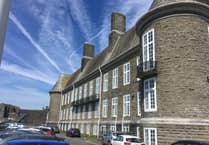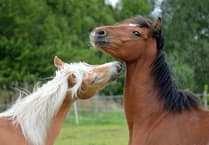Bottlenose dolphin acoustic research in Cardigan Bay has received a major funding boost.
The Wildlife Trust of South and West Wales is celebrating a £560,000 National Lottery grant to support marine and grassland conservation projects lasting three years.
The bottlenose dolphin acoustic research, carried out by New Quay-based Cardigan Bay Marine Wildlife Centre, is the only project of its kind in Welsh waters.
Information gathered will enable the trust to determine the presence of dolphins at specific sites.
By recording individual dolphins’ signature whistles (unique identity signals) and gathering photo-identification information the project aims to track their movements, inside and outside of the Special Areas of Conservation (SACs).
It has also announced a project to preserve ‘globally important’ seabird populations on and around the island of Skomer in Pembrokeshire. The island is home to over 800,000 birds each summer - including puffins, guillemots, razorbills, and kittiwakes.
CBMWC Marine Conservation and Research Manager Dr Sarah Perry said: “Our marine wildlife is under threat and there is an urgent need to understand the current condition of internationally important seabird and marine mammal populations in our waters if we are to respond and adapt to the climate crisis and have a chance of reversing the nature crisis.
“By using a dual visual and acoustic identification approach into the bottlenose dolphins found in Cardigan Bay we hope to be able to offer a greater insight into their lives including information on their associations, population structures and movements of these animals to help protect them into the future.
“There is increasing evidence that interacting with wildlife can have a positive impact on our mental wellbeing.
“We look forward to developing our volunteering and youth engagement programs and working alongside local people as part of this project.”
Head of Islands and Marine Conservation Lisa Morgan said: “Guaranteed funding for the next three years will provide continuity for long-term studies whilst enabling novel approaches to some unanswered questions, helping us to identify threats to marine wildlife.
“With the summer fast approaching and the seas calming, our staff are already busy delivering the first season of seabird and cetacean surveys.”
It also received £250,000 towards a two-year project that will support the restoration of healthy, resilient, species-rich grasslands which are under threat in all areas of Wales and make up 40 per cent of the UK total.
The funding will go to projects in 11 designated nature reserves including Rhos Fullbrook, a site of special scientific interest, near the Cors Caron raised bog just outside Tregaron.
Trust chief executive Sarah Kessell said: “Semi-natural, species-rich grasslands in Wales are under more threat than many other habitats, from a huge range of factors including fragmentation, intensified agriculture, and a reduction in cattle grazing, the livestock that produce the most diverse sward.”





Comments
This article has no comments yet. Be the first to leave a comment.